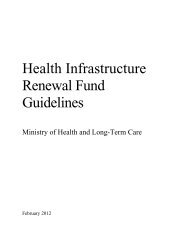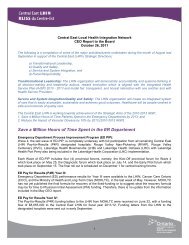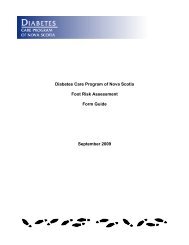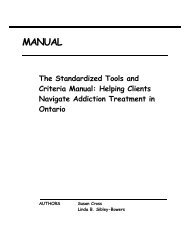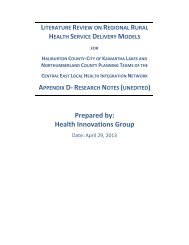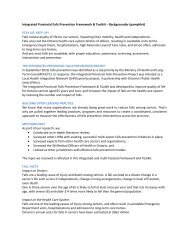CDE Appendix 1 Literature Review - Central East Local Health ...
CDE Appendix 1 Literature Review - Central East Local Health ...
CDE Appendix 1 Literature Review - Central East Local Health ...
Create successful ePaper yourself
Turn your PDF publications into a flip-book with our unique Google optimized e-Paper software.
The Culture, Diversity and Equity Project: <strong>Literature</strong> <strong>Review</strong><br />
Frameworks<br />
Three main types of health equity frameworks emerged in the literature. Each of these frameworks approaches the<br />
problems to be tackled in slightly different ways. Though they are not explicitly named this way in the literature, we<br />
can refer to these overarching frameworks as:<br />
• <strong>Health</strong> equity frameworks;<br />
• <strong>Health</strong> care equity frameworks; and<br />
• <strong>Health</strong> equity in health care frameworks.<br />
<strong>Health</strong> Equity Frameworks<br />
<strong>Health</strong> equity frameworks are concerned with reducing disparities in health status broadly conceived and measured<br />
in terms of mortality and morbidity statistics, etc.<br />
Such frameworks focus on all potential determinants of health status, including those that extend beyond the health<br />
care system. These frameworks are exemplified by the WHO’s 2008 Closing the Gap Framework, New Zealand’s<br />
2002 Framework for Reducing Inequalities in <strong>Health</strong> and the Canadian Institute of <strong>Health</strong> Research’s (CIHR) 2002<br />
Population <strong>Health</strong> Framework.<br />
<strong>Health</strong> equity frameworks generally point towards ‘whole-of-government’ approaches to addressing health status<br />
inequities, since many of the strongest determinants of health status are located ‘upstream’ from the health care<br />
sector in broad social, political, and economic policies (e.g., poverty reduction). <strong>Health</strong> equity frameworks can be<br />
further subdivided between those that are primarily theoretical, exploring the causes and determinants of health<br />
status, and those that are focused more directly on evidenced-based intervention strategies (‘strategic intervention<br />
frameworks’).<br />
What makes the health equity frameworks discussed in this review so effective is that they:<br />
• Adopt a holistic understanding/definition of ‘health’ which enables them to recommend a wider range of<br />
preventative and health-promoting interventions beyond traditional medical-model approaches (that concentrate<br />
solely on treating individual illness); and<br />
• Ground proposed policy interventions in scientific and theoretical evidence, permitting more productive<br />
dialogues between stakeholders.<br />
Among the major limitations of such frameworks is the fact they bring into policy consideration various<br />
determinants of health that are beyond the immediate control of the health care sector such as poverty. Many such<br />
frameworks - at least from the more limited and immediate health care service/system vantage point - are better at<br />
identifying problems than offering solutions.<br />
In fact, the broad diagnoses and prognoses gained from these frameworks often require extensive intersectoral<br />
collaboration with stewardship at a national level, which itself poses many challenges, due to the structural<br />
organization of government along departmental lines (see WHO, 2008; Public <strong>Health</strong> Agency of Canada, 2007;<br />
PHAC & WHO, 2008).<br />
<strong>Health</strong> care Equity Frameworks<br />
<strong>Health</strong> care equity frameworks are concerned more narrowly with inequities in the accessibility and quality of health<br />
care services. They focus on disparities between advantaged and disadvantaged populations that can be traced back<br />
to the health care system: this includes, for example, access to primary care physicians and health practitioner<br />
stereotyping/racism, leading to inequitable diagnoses and treatment.<br />
3



